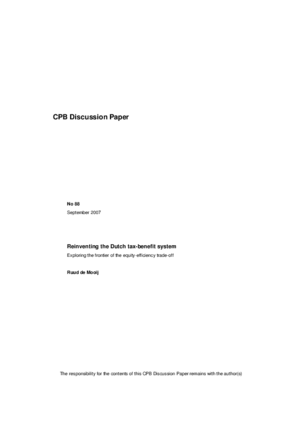September 10, 2007
Reinventing the Dutch tax-benefit system; exploring the frontier of the equity-efficiency trade-off
European governments aim to raise labour supply, cut unemployment and, at the same time, maintain social cohesion.
Yet, economists have stressed the trade-off between these objectives. This paper reviews the key policy insights from optimal tax theory to identify options for reform in the tax-benefit system that can potentially improve the equity-efficiency trade-off.
Using a comprehensive applied general equilibrium model, we then explore whether reforms along these lines in the actual Dutch tax-benefit system will raise employment without sacrificing equality. The analysis reveals that selective tax relief for elastic secondary earners and low-skilled workers have this potential. A flat income tax structure possibly combined with a negative income tax worsens the equity-efficiency trade-off.
Authors
Ruud de Mooij
